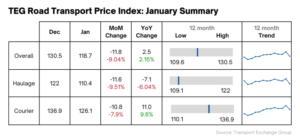The latest data from the TEG Road Transport Price Index has revealed that both the courier and haulage vehicle price-per-mile have fallen in January, following an all-time high in December.
The overall index fell by 9% to 118.7, following the trend seen every January for the last four years, where prices peak in December and settle in the New Year.
Haulage prices declined by 9.5% to 110.4, a figure that represents a 6% year-on-year fall. Courier prices dropped by 7.9% from December to January, but remain 9.6% higher than this time last year – a sign of rising operational costs being passed on to courier customers.
 The cost of petrol is now falling to January 2022 levels, but diesel does not seem to be dropping at the same rate. In January 2021, diesel cost around 4p per litre more than petrol. Now, a litre of diesel costs 22p more than a litre of petrol, representing a huge, unavoidable business cost for HGV and LGV operators.
The cost of petrol is now falling to January 2022 levels, but diesel does not seem to be dropping at the same rate. In January 2021, diesel cost around 4p per litre more than petrol. Now, a litre of diesel costs 22p more than a litre of petrol, representing a huge, unavoidable business cost for HGV and LGV operators.
If the freeze on fuel duty isn’t renewed in March, fuel prices could shoot up by a further 23%. At the same time, China is reopening its economy to the world after strict Covid-19 lockdowns, which is predicted to push fuel demand and prices even higher.
The RHA’s annual Haulage Cost Movement Survey has found that the cost of living crisis has led to price hikes in key areas for drivers and hauliers. Fuel is the main culprit behind the overall price rise, accounting for 7.4% of the overall yearly increase. If such cost increases don’t stop, road transport businesses will be forced to pass the increase onto their customers.
Lyall Cresswell, CEO of Transport Exchange Group, says: “Having closely tracked haulage and courier prices for the past four years, we’ve come to expect the trend of prices dropping in January, following peak demand in the run-up to Christmas.
“A new factor for price trends, however, is the price of diesel stubbornly refusing to come down in line with petrol prices. For an industry that remains reliant on diesel, this is a significant business cost.
“There’s a real push for alternative fuel vehicles, but that won’t solve the imminent cost issue. In the short term, many road transport businesses might simply have to charge their customers more.”
Kirsten Tisdale, director of logistics consultants Aricia Limited and Fellow of the Chartered Institute of Logistics & Transport, says: “Although the drop between December 2022 and the January 2023 TEG Index looks dramatic when seen on its own, it’s actually part of a reasonably predictable pattern. The various elements of the index are all pretty much where you’d have expected them to be, based on applying the percentage change from 2019 to 2020, which is what we all used to consider ‘normal’.”















